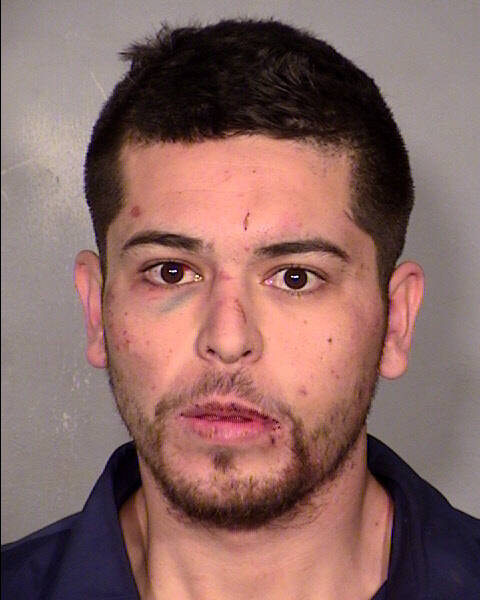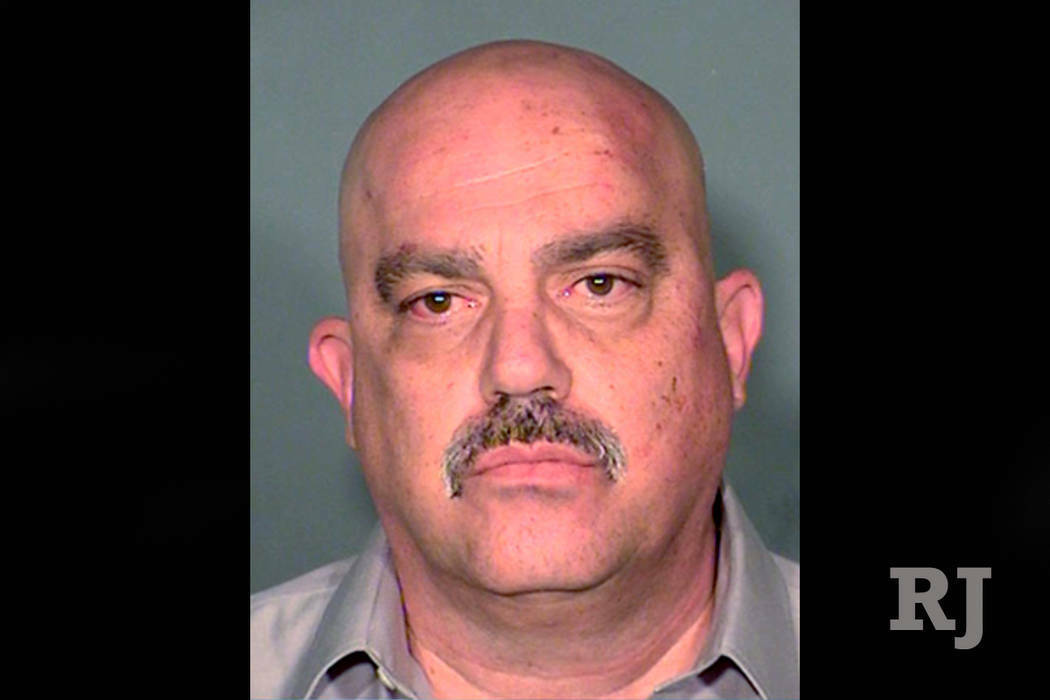Here’s why public employees fired for misconduct get their jobs back
Dozens of government employees in Nevada accused of misconduct were fired and then reinstated through arbitration in the past five years — despite sustained allegations and supervisors deeming them unfit for the job.
Roughly 50 state and local employees were fired for misdeeds such as excessive force during arrest, improperly treating diabetic children and calling for more terror attacks like Oct. 1 to boost overtime, a Review-Journal investigation found. Yet they were rehired after review by arbitrators or hearing officers who often confirmed misconduct.
Along with getting their jobs back, reinstated employees usually receive thousands in back pay and benefits, records show, and could potentially re-offend. At least one did.
All governments, except the State of Nevada, hid the names of the rehired workers citing personnel privacy. The Review-Journal was able to identify some of the employees by comparing the circumstances in the decision with police reports and other records. Without knowing the names, the cost to taxpayers can’t be calculated.
Nearly all cases have not been previously made public, with the exception of the 2017 reinstatement of Clark County School District police Sgt. Anthony Russo. Russo was fired after a DUI crash where he punched and pulled his gun on the people in the vehicle he struck. An arbitrator gave him his job back, records show.
Cases that weren’t publicized include:
— A Las Vegas Metropolitan Police officer working during the Oct. 1, 2017, mass shooting who wished for more terror attacks so he could get overtime. “We f---ing need more terrorist attacks like this,” he said to a fellow officer, caught on bodycam. He was fired but got his job back and then fired for subsequent, unknown misconduct, according to records and union staff.
— Another officer caught on video who put a handcuffed armed robbery suspect in a chokehold in a Strip shopping mall and then kneeled on his neck for several minutes.
— And a CCSD nurse’s assistant three times failed to properly treat low blood sugar in diabetic children.
Often the arbitrators reinstate the employees for technical reasons, such as they weren’t provided proper notice of the investigation, a review of the decisions shows.
Other times the arbitrators, most of whom never worked as police or school officials and receive thousands of dollars for each hearing, overrule supervisors who have done the jobs for years. Most arbitrators are lawyers or retired judicial officers.
“One of the most striking takeaways from my perspective is the arbitrators have rationalized that protecting those officers and employees is more important than protecting the community from this level of violence and abuse,” said ACLU of Nevada executive director Athar Haseebullah, who read a number of arbitration decisions at the Review-Journal’s request. “It deteriorates and defeats the public’s trust in the times the department is seeking to take appropriate action.”
But Steve Grammas, president of the Las Vegas Police Protective Association, said his members need protection from unfair punishment. “Sometimes, it’s totally arbitrary and (a supervisor) says we never liked this kid and he shouldn’t be here,” he said. Arbitration “takes some of the subjectivity out of it.”
The LVPPA represents rank-and-file employees, but Grammas said there are times when the union doesn’t support a grievance if association officials determine the discipline fits the department’s policies.
An April 2021 Review-Journal investigation on discipline and accountability reported a Henderson corrections officer sent photos of himself naked to a colleague. He had been fired years earlier after a drunken driving arrest but reinstated by an arbitrator. After that, he was disciplined for sexual harassment and a battery arrest, records show. He’s still employed at the city jail.
Metro, CCSD, seven arbitrators, and the reinstated employees that the Review-Journal could identify, either declined or did not respond to requests for comment.
Of the nearly 3,000 employees terminated by the state, CCSD, Henderson, Las Vegas, North Las Vegas, Clark County and Metro since 2015, about 270 appealed, and 47 won those appeals and were reinstated.
Employee names hidden
Victims of government employee misconduct often are unaware of the employee’s disciplinary histories — information regularly kept secret from the public or even complainants.
All local, school and county governments conceal the names of the fired and then-reinstated workers. But state officials determined employee names are public because the decisions happened during public hearings.
That may change going forward because the Nevada Legislature allowed state employees to unionize in 2019. Stephanie Klapstein, spokeswoman for the state Department of Administration, said arbitration hearings are no longer public for union employees, but names of fired workers will generally be released unless there is a “privacy interest.”
Nevada Press Association executive director Richard Karpel said taxpayers have a right to know what public employees that they pay are doing, and what consequences supervisors are imposing.
“It’s a disservice shielding government behavior and government performance — we need to know this stuff,” he said.
Assemblyman Jim Wheeler, R-Minden, said one of his biggest concerns with state employee unionization was the arbitration provisions often written into collective bargaining contracts.
“When the unions get involved, they usually call in an arbitrator from California and it’s not local people knowing local matters,” he said. “An arbitrator from California in contract negotiations usually sides heavily with the union.”
Metro sheriff candidates Kevin McMahill, the former undersheriff, and Tom Roberts, a former assistant sheriff who is now a state assemblyman, said union contracts make it difficult to change the arbitration process, but there needs to be a way to disqualify arbitrators who repeatedly make bad or unsupported rulings.
“We have to make sure the decision is based on the facts and not just willy-nilly and doesn’t mesh with the case,” McMahill said.
Both men also said they would support releasing the names of police officers who were fired and reinstated if state law and court rulings allow it.
“I believe in transparency,” Roberts said. “I agree the public pays for the police department, for that service, and should have better access to records.”
The third declared candidate for sheriff, Stan Hyt, could not be reached for comment.
The appeals took anywhere from two months to more than two years with employees away from work during that time, but in most cases receiving back pay and benefits after reinstatement, records show.
[ Misdeeds, firing, arbitration: 8 who got jobs back in Nevada ]
Through public records requests and analysis, the Review-Journal was able to detail four cases of employees fired for misconduct and the decisions made through an arbitration process to restore their jobs.
Oct. 1 mass shooting overtime
An 11-year Metro veteran was fired after a series of actions during the Oct. 1 mass shooting response that supervisors found inappropriate, the arbitration record shows. The officer, who couldn’t be identified from public records, went home to eat during his shift on the evening of Oct. 1, 2017, and turned off his police radio while discussing a personal matter.
During the officer’s break, a gunman started firing on the Route 91 Harvest music festival crowd, and the officer only learned of it after turning his radio back on. He was dispatched to move people away from Mandalay Bay but was heard on his body camera welcoming similar attacks, according to the arbitration decision and bodycam video obtained by the Review-Journal.
“Gonna get some motherf---ing overtime for this,” he tells a fellow officer. “That’s 36 hours of overtime. Yeah, I don’t think I am going to pass that up no matter how much — no matter how much I hate this department. We f---ing need more terrorist attacks like this.”
As he and other officers were directing people, the officer is heard being dismissive of a woman who comes to him saying someone attempted to rape her. He tells her to move along and file a report later and then turns to his fellow officer and said: “Ahh, someone just tried to rape me,” in what the arbitration decision describes as a “mocking tone.”
The arbitrator, Gary L. Axon, reinstated the officer with back pay, citing the officer’s prior “discipline-free” work performance. Axon wrote a 20-day suspension was more appropriate for the misconduct — though department policy limits suspensions to 40 hours. “The Employer’s legitimate interest in discouraging Grievant’s behavior will be served by a substantial suspension short of immediate discharge,” Axon wrote, noting that two sergeants were so stressed out by the shooting they couldn’t do their duties but weren’t fired.
Axon, who has a law degree from Drake University but whose license is suspended for nondisciplinary reasons, according to the Oregon State Bar, has conducted arbitration in union disputes for government agencies as well as businesses like Boeing, his resume shows.
Grammas said after the officer’s reinstatement in 2019 he was fired for subsequent misconduct but could not recall the details or timing. Metro refused to provide additional information about the officer and others who were reinstated, citing personnel privacy.
Excessive force on video
Metro Detective Benjamin Rose was fired in September 2015 for excessive force during an arrest at the Miracle Mile Shops mall on the Strip. Rose spotted Brian Rodriguez, of Norwalk, California, as matching the description of a suspect in a series of armed robberies at casino parking lots, police and court records show.
Metro redacted Rose’s name, but the Review-Journal identified through him police reports and his grand jury testimony.
When Rose attempted to arrest Rodriguez, the suspect started swinging at the officers, grabbed Rose’s crotch, repeatedly bit Rose and struggled until he was cuffed, police reports and a YouTube video of the incident shot by a bystander show. But after he was subdued, Rose put Rodriguez in a chokehold, didn’t call for medical treatment and kneeled on his neck for several minutes, the video and arbitration report show. Rose claimed during the internal affairs investigation that Rodriguez was starting to break away again.
IA investigators also found Rose unprofessional for swearing at the suspect, and untruthful for saying that the suspect tried to break away.
While not disputing many of the facts, arbitrator Kathryn Whalen determined that termination was too severe a punishment and decided a 40-hour suspension was more appropriate. “I have concluded that the Department failed to establish that Grievant committed gross inappropriate use of force, but did prove inappropriate use of force during the incident with (REDACTED) on April 2, 2014,” she wrote on May 26, 2016. “I also concluded that the Department established that Grievant violated the Interaction with Public Policy, but failed to meet its burden with respect to his alleged untruthfulness.”
Whalen practiced labor and employment law for 15 years in Portland, Oregon, and became a full-time arbitrator in 2003.
Rodriguez’s aunt, Judith “Judy” Ojeda, filed complaints of excessive force with the Citizen Review Board, FBI and Metro internal affairs after seeing the bystander video. She did not know until the Review-Journal contacted her that Rose was fired but reinstated five years ago. She said if Rodriguez had been older, had medical problems or Rose would have kneeled on him longer, he could have died like George Floyd in Minneapolis.
“It’s ridiculous to allow a police officer to stay on the force after what he did to my nephew,” she said in a phone interview.
Rose did not return calls seeking comment, but Grammas pointed out that Rodriguez injured Rose during the incident. Rose suffered bites to his wrists, left calf and right thigh and had a shoulder contusion and strained hamstring for which he was given Ibuprofen and an antibiotic, the arbitration report said. Rodriguez continued to fight police during transport to jail and was fitted with a spit mask, the report said.
Grammas conceded that recent events make kneeling on a suspect’s neck problematic and that the hold isn’t even effective because it’s easy for a suspect to push the officer off. “Post-George Floyd, it’s not necessary and it’s not good control,” he said.
Ojeda said her nephew, who was sentenced to as much as 45 years in prison after pleading guilty to armed robbery, kidnapping and burglary charges, had no prior criminal history and lost his mother just before his robbery spree.
“He’d never been in trouble and had a really good heart,” she said. “I was shocked when this happened.”
Clark County spokesman Erik Pappa said the CRB dismissed Ojeda’s complaint but any public records related to that decision are no longer available.
Metro paid Rose $47,600 after he was reinstated, records show.
Diabetic child treatment
At Fertitta Middle School, a first-aid safety assistant with more than 30 years at the Clark County School District, was fired in 2018 after she three times failed to properly treat diabetic students who were exhibiting low blood sugar — a potentially life-threatening disorder, arbitration records show.
The assistant, whose name was redacted, miscalculated the amount of carbohydrates the students needed to take by rounding up instead of down, “which is not allowed and dangerous,” the decision says. She also left a child with low blood sugar with another staff member because her shift ended at 3:30 p.m., saying she was tired of being a “team player,” the records show. The district also said she lied about notifying one of the children’s mothers of the medical condition.
Arbitrator Mark Burstein found the district proved its case on insubordination and failing to administer the right treatment but wrote there was insufficient proof she lied about calling the mother. He justified leaving a child with another staff member because the other staffer was also trained as a safety aide, records show.
“Similar misconduct in the future could result in exposing diabetic students to complications that could jeopardize their health,” he wrote. But he decided that the district’s punishment was too severe and reinstated her with a six-month suspension.
Racial memes on Facebook
In 2016, a Metro corrections officer was fired for posting memes disparaging African Americans, referring to inmates as “turds” and the detention center as a “cesspool,” arbitration records show. One posting was a picture of two monkeys eating at a table where he wrote: “Better mannered than many at the Cesspool!”
In his defense, union representatives introduced nine similar violations of social media policy that other officers posted between 2014 and 2016. Those employees were given a written reprimand, records show.
Arbitrator Eric B. Lindauer ruled that the officer, a 13-year veteran with no prior discipline, did not violate the department’s social media policy because there was no proof the postings impaired or impeded the officer’s ability to work with co-workers.
But Lindauer found that the posting put the Clark County Detention Center in a bad light and impeded the ability of the agency to serve the public. Lindauer rejected the union’s contention of problems with the investigation but found the termination too harsh. He reduced it to a 40-hour suspension.
It “is the decision of the Arbitrator that the employer … had just cause to initiate disciplinary action against, the Grievant,” Lindauer wrote on Nov. 15, 2016. The “Arbitrator has also concluded the penalty of termination, under all the circumstances of this case, was unreasonable and deserving of modification.”
Haseebullah urged lawmakers to explicitly make government personnel records public under state law so there was more transparency over who was reinstated and why the employee was fired.
“How many legislatures have made it public — that’s a testament to the strength of those opposed to” releasing information government employees, he said. “They don’t want to take a position that offends a massive amount of people.”
Contact Arthur Kane at akane@reviewjournal.com and follow @ArthurMKane on Twitter. Kane is a member of the Review-Journal’s investigative team, focusing on reporting that holds leaders and agencies accountable and exposes wrongdoing.





















